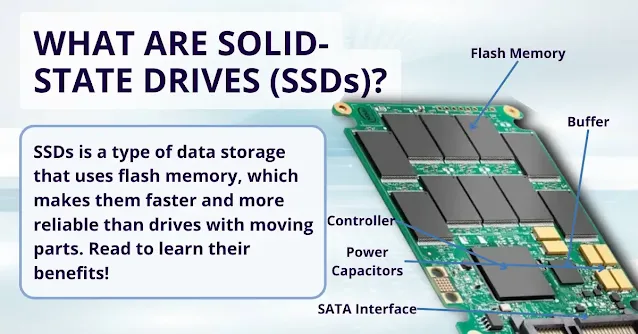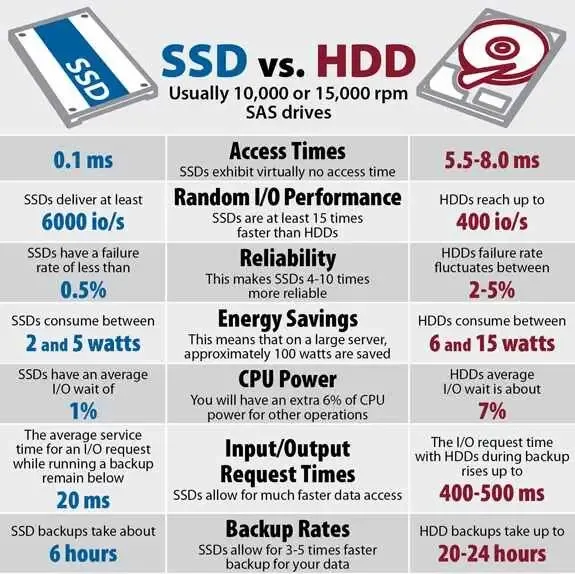Estimated Reading Time: 5 minutes
What Is the Difference Between SSD and HDD? Which One Should You Choose?
The two most commonly used types of storage drives are Solid State Drives (SSDs) and Hard Disk Drives (HDDs). Both offer unique features, but which one is the right choice for your needs? In this article, we’ll break down the differences between SSDs and HDDs, and help you make an informed decision based on factors such as speed, durability, capacity, and cost.
What Is an SSD (Solid State Drive)?
An SSD (Solid State Drive) is a modern storage device that uses flash memory to store data. Unlike traditional hard drives, which rely on spinning disks and moving parts, an SSD has no moving components, making it faster, more durable, and energy-efficient.
Key Features of SSDs:
- Speed: One of the most significant advantages of an SSD over an HDD is speed. SSDs are much faster when it comes to data transfer rates, boot times, and application load times. This makes them ideal for users who require high performance, such as gamers, video editors, and professionals who work with large files.
- Durability: Since SSDs do not have moving parts, they are less likely to fail due to physical shock, vibration, or drops. This makes them a great choice for laptops or portable devices.
- Energy Efficiency: SSDs consume less power than HDDs, making them perfect for battery-powered devices, such as laptops, where battery life is important.
What Is an HDD (Hard Disk Drive)?
An HDD (Hard Disk Drive) is a traditional storage device that stores data on spinning magnetic disks. While it has been the standard for personal and professional computing for decades, it is slowly being replaced by faster, more efficient SSDs.
Key Features of HDDs:
- Capacity: One of the primary reasons people still choose HDDs is their capacity. HDDs offer larger storage sizes at a more affordable price. For example, it is easier and cheaper to find a 1TB or 2TB HDD than an SSD with the same storage capacity.
- Cost-Effective: HDDs are significantly cheaper than SSDs when considering the cost per gigabyte. For users who require a large amount of storage but do not need the extra speed, an HDD is still an excellent option.
- Availability: HDDs have been around for a long time and are still widely available in both desktop and laptop models. They are also commonly used in external hard drives for data backup and storage.
SSD vs HDD: Key Differences
Understanding the main differences between SSDs and HDDs can help you determine which one fits your needs best.
1. Speed and Performance
One of the most significant differences between an SSD and an HDD is speed. SSDs offer lightning-fast data read and write speeds, making them much more efficient for everyday tasks like booting your operating system, loading programs, and transferring files. In comparison, HDDs are slower due to the mechanical parts involved in accessing data.
- SSD Speed: Up to 550 MB/s (depending on the model).
- HDD Speed: Typically around 100-150 MB/s.
If you need high-speed performance, such as for gaming, video editing, or multitasking, an SSD is the clear winner.
2. Durability and Reliability
Because SSDs have no moving parts, they are less likely to suffer from wear and tear. This makes them much more reliable in the long run, especially in mobile environments where devices are more prone to shocks and vibrations. HDDs, on the other hand, rely on spinning disks and read/write heads, which makes them more vulnerable to physical damage.
If you are looking for a reliable storage solution that can withstand drops and bumps, SSDs are the better option.
3. Storage Capacity
When it comes to storage capacity, HDDs take the lead. HDDs are available in larger sizes, often up to 10TB or more, while SSDs are generally limited to smaller sizes due to the higher cost of flash memory.
However, if you don’t need massive storage and prioritize speed over size, an SSD might be the better choice, even though it may have a smaller capacity. For users requiring large storage for movies, games, or backup files, an HDD might be the more suitable option.
4. Cost and Value
The cost per gigabyte for HDDs is much lower than that of SSDs, which is why HDDs are a cost-effective option for users on a budget or those who need larger storage at a lower price. However, if you are willing to invest more for faster performance and improved durability, an SSD might be worth the additional cost.
- 1TB SSD: $50 to $120 (depending on model).
- 1TB HDD: $30 to $50.
If cost-efficiency is a top priority, an HDD will save you money. But if performance and speed are more important, an SSD is worth considering.
Which One Should You Choose: SSD or HDD?
When choosing between an SSD and HDD, there are several factors to consider:
For SSD:
- If you need fast data access for tasks like gaming, video editing, or professional workloads.
- If reliability and durability are crucial for your device (e.g., for laptops or external drives).
- If you prioritize energy efficiency for battery-operated devices.
For HDD:
- If you need large storage capacity for data-heavy applications or for archiving large files like movies, music, or backups.
- If you are on a budget and need to maximize storage without worrying about speed.
- If you don’t need ultra-fast access to your data, and can handle longer load times.
SSD or HDD — Which Is Right for You?
In the battle of SSD vs HDD, there is no one-size-fits-all answer. If speed, durability, and efficiency are your priorities, an SSD is undoubtedly the better option. On the other hand, if you need a large amount of storage at a lower price, an HDD might still be the right choice for you.
Ultimately, it boils down to your individual needs. If budget and storage capacity are important, HDD is the way to go. But if you are seeking a faster, more responsive, and durable solution, investing in an SSD will give you the best performance in the long run.
For the ultimate experience, consider using a dual-drive setup, where you combine the speed of an SSD for your operating system and essential applications, with the large storage capacity of an HDD for your data and backups. This combination can offer you the best of both worlds!
Tips:
- Difference between SSD and HDD
- Which is better SSD or HDD
- SSD vs HDD for gaming
- Advantages of SSD over HDD
- SSD or HDD for laptops
- Best storage option for video editing
- HDD vs SSD performance comparison
By using these long-tail keywords and focusing on a user-focused, informative article, you will rank higher in search engines, while also providing valuable content for users who are looking for detailed comparisons between SSDs and HDDs.
Reference Source:
https://www.avast.com/c-ssd-vs-hdd
https://aws.amazon.com/compare/the-difference-between-ssd-hard-drive/


.webp)

.webp)